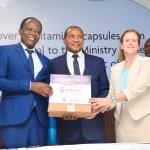SADC Pooled Procurement
About SPPS
SPPS is an initiative that aggregates bulk orders from all SADC Member States through negotiated prices and delivery conditions with manufacturers. The SPPS procurement process begins with the SADC Member States identifying their requirements. MSD floats tenders and shares the price catalogue, where Member States select items for purchase and submit their orders.
A supply plan is created where Member States are informed about the total value of savings and delivery schedules. Other procurement processes are carried out henceforth as per the SPPS Guidelines.
MSD SADC PROJECT IMPLEMENTATION
In 2017 SADC Ministers of Health and Ministers responsible for HIV and AIDS during their regional meeting held in November in Polokwane - South Africa, approved Tanzania through MSD to handle pooled procurement services (SPPS) of health commodities for 16 SADC member states which have estimated population of 346 million people.
The offer was then communicated to the United Republic of Tanzania in February 2018 and on 9th October 2018, MSD and SADC secretariat signed the MoU as the first step to operationalize the SPPS. An office within MSD responsible for SADC pooled procurement services was established and its operations officially commenced in January 2019.
The ultimate reason behind MSD's appointment to oversee SPPS was due to her well-established distribution network and modern cold chain facilities and storage capacity centralized with a synchronized ICT system to ensure supply chain operations are harmonized across all MSD.
SADC Member States
- Angola
- Botswana
- Comoros
- DRC
- Eswatini
- Lesotho
- Madagascar
- Malawi
- Mauritius
- Mozambique
- Namibia
- Seychelles
- South Africa
- Tanzania
- Zambia
- Zimbabwe
MSD Responsibilities through SPPS.
a) Implementing, monitoring, supporting, and managing e-pooled procurement services of health commodities for the SADC region;
b) Supporting the sustainability of Pharmaceutical Procurement and supply chain Management Activities in the SADC region;
c) Coordinating information sharing with manufacturers and SADC Member States
d) Improving production and capacity of existing production plants,
e) Attracting new investors in the SADC countries,
f) Pushing regional integration and the industrialization agenda,
g) Ensuring cost efficiency in procurement and improving stock availability.
h) Performing any other activity needed to ensure the efficient procurement of essential medicines and health commodities.
i) Coordinate the approaches to intellectual property management needed to ensure pharmaceutical procurement.
Key MSD SADC Accomplishments
Since the establishment of the SADC Pooled Procurement Services office. Some of the accomplishments that MSD has achieved include:
i. Developed SPPS Guidelines and Supply Chain Management System;
ii. Conducted SADC Pooled Procurement regional technical meeting in 2019 in the United Republic of Tanzania to enable information sharing
iii. Developed an electronic platform (e-SPPS) to handle all SPPS supply chain management transactions within the region;
iv. Signed 41 contracts with manufacturers for health commodities;
v. Raised awareness on utilization of the SPPS facility through conducting meetings with SADC Ambassadors accredited to Tanzania and SADC countries;
vi. As of February 2022, three (3) Member States are utilizing the SPPS, namely: the United Republic of Tanzania, Comoros, and Seychelles, and have saved between 35%-70%.
vii. Three (3) Member States namely Mozambique, Malawi, and Botswana have shown interest in utilizing the SPPS platform.


